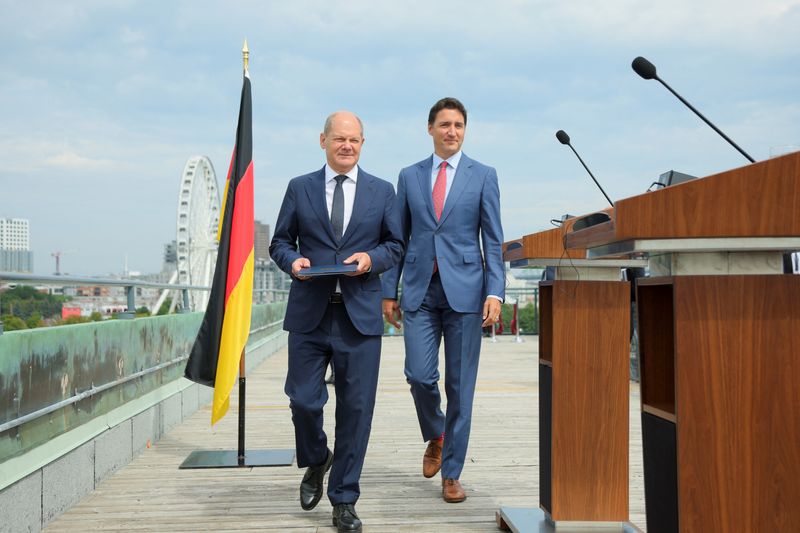Germany’s Scholz kicks off Canada visit focused on minerals, energy
2022.08.22 19:09
3/3

Germany’s Chancellor Olaf Scholz and Canada’s Prime Minister Justin Trudeau attend to speak to the media in Montreal, Quebec, Canada August 22, 2022. REUTERS/Christinne Muschi
2/3
By Andreas Rinke and Steve Scherer
MONTREAL (Reuters) – German Chancellor Olaf Scholz met with Canadian Prime Minister Justin Trudeau on Monday morning in his first meeting of a three-day trip focused on cultivating alternative sources of critical minerals for electric vehicles (EVs) and energy.
Canada will ink Memorandums of Understanding (MOU) with Volkswagen (ETR:VOWG_p), a Canadian government source said, and with Mercedes-Benz Group AG, according to sources in Canada and Germany, to develop supply chains for critical minerals like nickel, lithium and cobalt that are used in EVs.
Both will be announced on Tuesday in Toronto, the Canadian source said.
The MOUs “will show the partnership that these two companies see in Canada,” the Canadian source said. “The companies will be moving along in partnerships, and signings and things like that with Canadian companies in the very, very near future.”
State Secretary for Economic Affairs Franziska Brantner, who is traveling with the German delegation, told Reuters on Monday the German car industry could invest in Canada to process lithium there right away.
“Canada has almost all the raw materials that Russia has – but it is democratic, offers reliable legal frameworks,” Brantner said.
VW CEO Herbert Diess is among those traveling with the Germany delegation, as is Mercedes-Benz Chief Technology Officer Markus Schäfer.
Meanwhile Scholz met with Prime Minister Justin Trudeau and members of his Cabinet on Monday morning and held a news conference afterward.
Germany fears a further reduction of natural gas supplies from Russia this winter in retaliation for Western sanctions following the invasion of Ukraine, Economy Minister Robert Habeck told German broadcaster ARD on Monday.
“Canada obviously wants to support our German and European friends and allies in the context of the situation that they are facing themselves in the short term,” Canada’s Natural Resources Minister Jonathan Wilkinson told Reuters last week.
During the interview, Wilkinson underscored Canada’s potential to provide clean hydrogen to Germany and the rest of Europe instead of trying to build new liquefied natural gas (LNG) terminals as the world pivots away from fossil fuels.
On Tuesday, Canada and Germany will sign an agreement in Newfoundland to develop clean hydrogen for export to Germany by as early as 2025, Wilkinson said.








